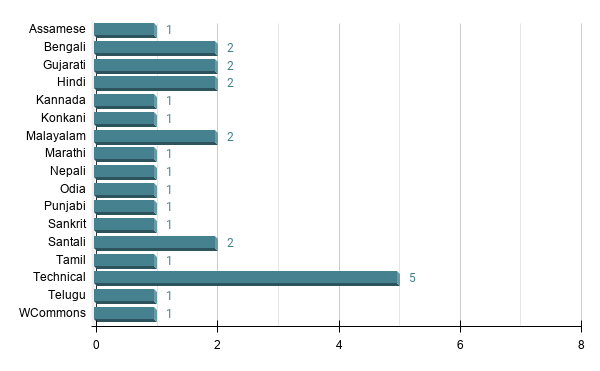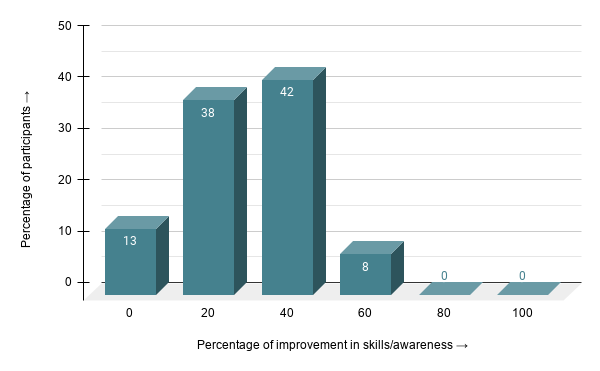Background
This blog post summarizes planning that went into designing a technical workshop series for the Indic community, key outcomes, success stories, lessons learned, and some next steps! It targets potential organizers who might be interested in conducting similar training in their wiki community.
Small Wiki Toolkits is an initiative for building technical capacity in smaller wiki communities. As part of this initiative, Wikimedia Foundation’s Developer Advocacy planned an in-person workshop series to take place in June 2020 for a local Wikimedia community that might need it and would benefit from it. After conversations with 4-5 wiki communities, the team decided to co-organize the first workshop series with volunteers in India. Considering that there are emerging technical contributors in the Indic community, and IndicTech-Com exists, an initiative purely run by the volunteer community, the thought was that this workshop series would help augment the ongoing efforts. Also, as the Indic Wikimedia community is home to more than 22 language communities, the success of this workshop series would allow us to model a similar concept in another community quickly. Though the original plan was to coordinate this series in an in-person setting, due to the COVID-19 pandemic, it adopted an online format.

Workshop planning and design
Planning this workshop series seemed challenging initially, especially as we wanted to design an experience that supports running hands-on technical workshops in an online format smoothly. We wanted attendees not just to be passive listeners but active participants in these workshops. So, experimenting with different online meeting tools and finalizing one that can work best for facilitators, organizers, and participants was also crucial. In this post, we share detailed planning that went into designing different components of the workshop and lessons learned along the way so that it might benefit potential organizers or trainers interested in piloting a similar workshop series in their community.
Concept
In December 2019, Indic community members ran a Community Engagement Survey for planning WikiConference India 2020, though the event itself has been put on hold as well, owing to the pandemic. We used this survey to ask a few questions to help understand the technical needs and challenges of Indic community members, and new technical skills they wanted to learn–responses from the survey indicated the following top 3 skills: writing user scripts and gadgets, writing Wikidata queries, and using Phabricator. Based on these responses, we finalized the workshop topics.
Participant demographics
In May 2020, a call for participants had been sent to Indic Wikimedia communities, and participants were selected based on their preference, background, and motivations to participate. Altogether, in the four sessions, there were 26 unique participants, and the total number of participants was 42 (i.e., an average of 10 participants per workshop). This series could have done better on the gender diversity front, as only 10% of all the participants were women–which is a reflection of women and non-binary individuals in general in Wikimedia technical spaces, especially in India.

Key outcomes
While the three workshops “Writing user scripts and gadgets”, “Writing Wikidata queries”, and “Using project management and bug reporting tool Phabricator” focused on capacity development as evident from their titles, the fourth entitled “Understanding the technical challenges of Indic language wikis” focused on brainstorming on the Indic community’s challenges. Participants reported that their skills and awareness increased by 30%, on average, and 8% percent of the participants said their familiarity with a technical topic increased by 60% after the workshop. These percentages indicate the workshop series made a decent impact on the technical front of Indic communities. Improvement indicates the participants have gained new skills they can build upon and that was the intent of these workshops.

Success stories
- Upon encouragement from the mentor and other participants in the “Understanding the technical challenges of Indic language wikis” workshop, User:Jayprakash12345 applied for the global interface admin rights (which is usually not easy to obtain), and his nomination was successful.
- Also, during this workshop, Malayalam and Konkani users reported that the Wikipedia:Twinkle gadget had been broken on their Wikipedias since a new update. Also, improper functioning of citoid on Malayalam was reported. As of July 2020, all issues reported from Malayalam have been fixed.
Observations and evaluation
What worked well?
- On average, the overall quality and usefulness of the series was rated 4.2 out of 5, which is a positive sign.
- The participant turnout (50-60% of selected) for the workshops was quite good, considering that they were online and amidst the pandemic. We think that keeping a selection process helped generate some commitment to attend the sessions.
- Limiting workshops to 15 participants was helpful for mentors to manage the sessions better. Though we never reached the maximum capacity, it was still a good measure to have limitations, as more numbers may have negatively affected the quality of these sessions.
- It was a great learning experience for the organizers to understand the dynamics of conducting a series of online workshops to have an impact equivalent to a two-day physical event.
- It helped us understand the technical landscape of Indic wikis–contributors, their challenges, perspectives, and interests.
- Participants reported that they would be using their learnings from these workshops in the following ways–building bots, importing gadgets into their local wikis, developing new gadgets, creating wikidata queries to use on their local wiki, among several others.
- Upon asking for additional feedback, we got the following responses, which indicate the value of these workshops and a need for their continuation, more so when designed with a specific local community in mind:
“I am looking forward for the “Understanding the technical challenges of Indic language wikis 2.0” session and such sessions should be arranged at least once in a month where we can discuss and solve issues facing by our Indic community.”
“The session was useful and moreover it was in Hinglish (A mix of Hindi and English) and I feel it was more adaptive for me to understand. The workshop started with the basics, which really helped me. Workshop was so interesting that some of the attendees were eager to learn more even after workshop time limits. I think it should not [be limited] to one session.”
“Overall experience of [the] workshop was excellent and I would say that such [a] kind of workshop should be organised frequently.”
What could be improved?
- Participation rates of female and non-binary individuals could be improved. This could be done by proactively reaching out to them during the call for participation phase.
- All the sessions overshot their actual end time, and in some cases, it was 50% more than what was actually planned for. As it was the first time, time required was not well calculated—if required it is better to break down into two smaller sessions, with a break in-between.
What’s next?
The Developer Advocacy team will soon be publishing lessons learned from the first year of the Small Wiki Toolkits initiative, including lessons learned from this workshop series. The team is also considering the technical challenges shared in this workshop series for planning new activities and projects to be engaged as part of the initiative. If a plan specific to the Indic communities is required, the workshop series organizers will take that on. The next steps will be announced on the Wikimedia-I/Wikitech-I mailing lists and via other communication mediums, hopefully by the end of September, so stay tuned!
Credits: Thanks to Jayprakash, Mahir, Birgit, Andre, and Satdeep for their massive help in mentoring and facilitating these workshops and to Alex for copy-editing this post!
For more information, please see the final report at https://w.wiki/Yqf.

Can you help us translate this article?
In order for this article to reach as many people as possible we would like your help. Can you translate this article to get the message out?
Start translation